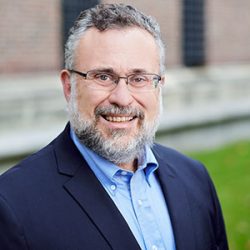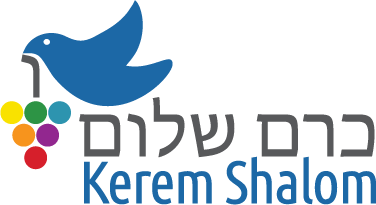October 2024

Shana Tova!
It is extraordinary to stand here and look out at you: the Kerem Shalom community, which has been gathering in this building for 36 years.
I want to start by thanking Rabbi Darby and Rosalie for again leading us in beautiful and meaningful services. It’s amazing to think that Rosalie has been providing music for our High Holy Days for 40 years and it’s hard to imagine what services will be like once you no longer are our cantor. I thank you from the bottom of my heart.
I also want to thank everyone whose hard work makes it possible for us to hold these services. To borrow a well-worn phrase, “it takes a village” to make all of this happen.
*****
As some of you know, I used to teach an undergraduate course about Boston. We had many guest speakers, including a dynamic and iconoclastic local leader who began a memorable talk by climbing up on the table in the front of the classroom, sitting cross-legged, and asking the stunned students “Why are you here?”
“Well,” one of them replied, “it’s Thursday and it’s 1 pm so it’s time for class.”
“Yes,” he replied, “but why are you really here? Why of all of the classes you could take, are you taking this one?
There was an awkward silence. A few students said that they had to take a gen-ed class to graduate, this one fit into their schedules, and didn’t seem too onerous. Thankfully, a few others said they really wanted to learn more about cities, particularly Boston.
I don’t remember what the speaker said after that. But his questions have stuck with me for years.
Now I’m not going to climb up and sit cross-legged on this lectern. But I am going to ask: “Why are you here?”
I suspect, for some of you, the answer is something like: “Even though I don’t often go to synagogue, I identify as Jewish and it would be weird not to be at services on Rosh Hashanah.”
But I encourage you to go deeper and reflect on the second question: “Why are you really here?”
More specifically, “Why did you decide to alter your routines and go to Rosh Hashanah services on this Thursday morning in October? And, having decided to go to services, why did you decide to come here, to Kerem Shalom in Concord?”
Some of you might say something like: “I am here because I believe that observing these holidays with this community offers a valuable opportunity to reflect on the current troubling state of the world while also celebrating the joy of community and the wonders of creation. Others might say: “I am here because I appreciate the opportunity for t’shuvah: to take stock, to reflect, to return, to change, to renew.”
Both statements partly explain why I am here today. But I also am here because I believe that what we are doing here today and over the next ten days is deeply connected with what we as a community do during the rest of the year.
So the larger reason that I am here is because I believe that modern progressive Judaism, as practiced here at Kerem Shalom (and elsewhere) can provide opportunities that will help me (and others) live in deeper, more meaningful, and more connected ways.
As Rabbi Michael Strassfeld has written (and here I’m paraphrasing a bit)
“Your friend asks you: ‘Why do you belong to a synagogue?” and … ‘Why do you attend on a regular basis?’ You answer: [I go to synagogue because there] I can join with a community to explore critical issues in my life and there I can find wisdom in a tradition that precedes me and will continue long after I’m gone. … There I [can] sit with no other agenda than to be present in the moment, to explore and reflect on the spiritual qualities that I strive for, to remind myself of the challenges of this broken world, and to commit myself to engage in acts of tikkun olam.”
That is my aspiration for Kerem Shalom.
And having that aspiration leads me to ask: “What do we need to do – or what do we need to keep doing – to be that kind of a community?” As I said at our annual meeting in June, I believe that we need to do five big things.
First, we should offer spiritually meaningful services and other opportunities for spiritual reflection. Over the course of the year, we will, in fact, be offering a rich and diverse array of services and other opportunities for spiritual growth. And, of course, looking forward we will have to begin a search for another cantor who can provide the musical spiritual leadership that Rosalie has given us for more than four decades.
Second, we should provide engaging, Jewish-related educational opportunities for children, for adolescents, and for adults. I’m thrilled that about 100 children are enrolled in our exciting Hebrew School Reimagined programs. And, thanks to the work done by Rosalie, our Adult Programming Committee, and others we again will be offering a rich array of classes and talks, including sessions that will focus on the troubling situation in Israel.
Third, we should engage in acts of “tikkun olam.” And, as you’ve heard, we’re in the midst of our annual High Holy Days Food Drive. In November, we will be doing a collection for Household Goods. Over the coming months, our Anti-semitism Task Force will be offering a variety of programs, including some focused on fostering nuanced and in-depth conversations about what is happening in Israel and our relationship to those events. And our Racial Justice Task Force recently prepared and sent 1,500 postcards encouraging people in Pennsylvania to vote.
Fourth, we should embrace opportunities to come together as a community, particularly in times of sadness (but also in times of celebration). We have a wonderful Chesed Committee, I strongly encourage you to sign up to receive their emails about members who need our help and support. And I encourage you to join us for community-wide celebrations, such as the Sukkah decorating party a week from Sunday.
Finally, it is critically important that we act as “stewards of the vineyard” the phrase our Legacy Giving Committee coined to honor those who make KS part of their estate plans. If we are being good stewards then we won’t ask too much of our staff or our committed volunteers. Because we are good stewards, we will be installing energy efficient heat pumps and introducing more native and ecologically beneficial plantings on our land. And as fiscal stewards we have launched initiatives like Legacy Giving campaign as part of our efforts to develop more sustainable long-term funding strategies for Kerem Shalom.
If we do these things, then Kerem Shalom can continue to be a place where we can grapple with important questions and challenges in our lives. It also can continue to be a place where we can explore our often complicated feelings on what it means to be Jewish in the United States in the first part of the 21st century.
I hope my remarks spur you to reflect more deeply about why you’re here and what does (or might) bring you back here over the coming year. I also hope that you’ll share those thoughts with each other, with me, and with members of our board. Doing so will be an important part of the process of ensuring that KS continues to be a meaningful Jewish home for all of us.
For now, though, I just say what an honor and privilege it is to serve as KS’s president and to wish all of you “shana tova,” a good and sweet new year.

